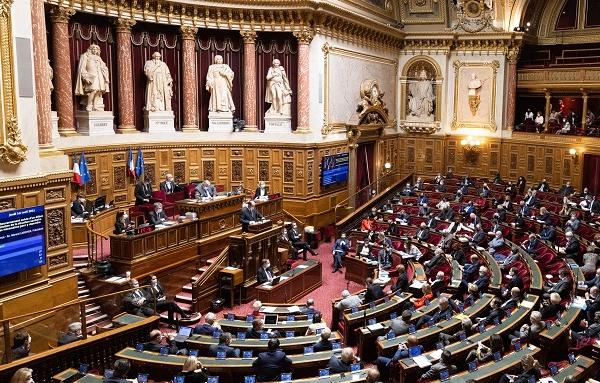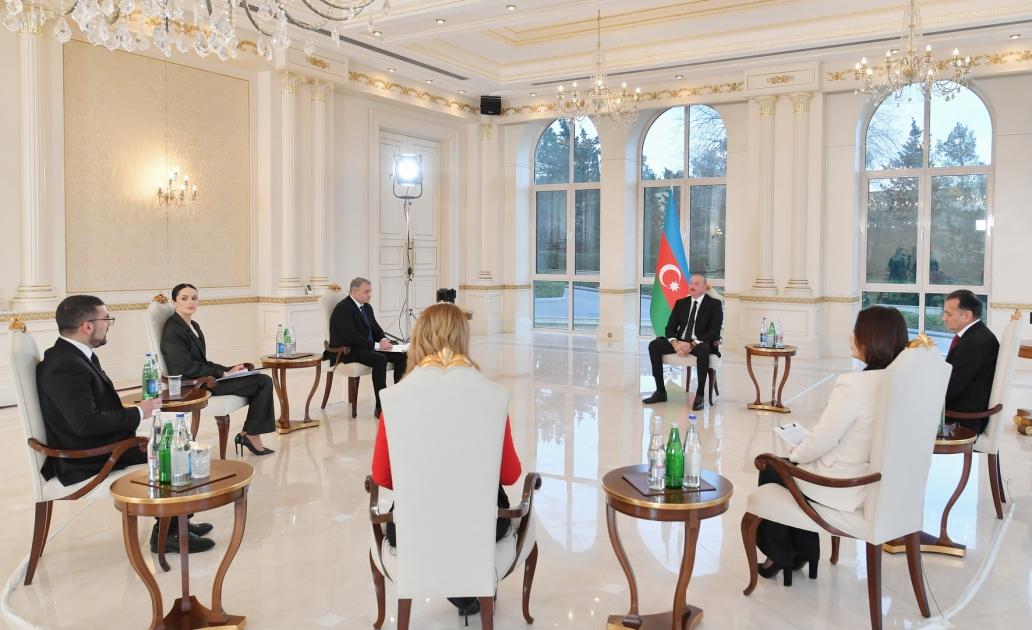France's advocacy for Armenians in South Caucasus & its ripple effects Unravelling the geopolitical chessboard
The French Senate has joined another disgraceful act vis-à-vis Azerbaijan as an appendage to the Élysée Palace's prejudiced and unwarranted policies, and the hope is to influence official Baku decisions that have resulted in re-establishing the nation’s full control over the entirety of its territory with restoration and reconstruction of the destroyed territories in full swing.
Heartened by glorious and smashing victories over the occupying Armenian forces in the Second Karabakh War of 2020 and ensuing years, Baku’s determination, sourced by the popular support in the face of feeble attacks of international organizations and various agencies of the French establishment, remains unshakable and resolute.
The French Senate’s anti-Azerbaijani resolution with 336 votes in favor and just one vote against sheds light on a myriad of issues the government of Azerbaijan should bear in mind in projecting its own policies about France and foreseeing overt and covert attacks coming from dark rooms of European nations with malicious activities to sow discord and create mayhem in the South Caucasus.

First and foremost, the French Senate’s resolution is absolutely against peace in the South Caucasus and will above all hit hard Armenians since this meaningless piece of paper signals nothing but misery for Armenians far away from Paris’ splendor and misery.
Like the Elysee Palace, the French legislators, in the grip of Armenian lobby groups, have lost touch with reality, and are irrational and unreasonable. This resolution runs against common sense, tranquillity peace, and stability, including shaping reality, practicality, and a better future for the South Caucasus.
The French establishment, fed by influential, toxic, and noxious Armenian lobby groups and their dirty money, is totally indifferent to the reality and recent unfolding developments. France along with several other nations with imperialistic past cannot digest the reality on the scene established by decisive political leadership under the powerful Azerbaijani army, manned by brave sons and daughters of the nation that underwent 30-year-long humiliation triggered by the occupation with the support of those nations in the service of evil in the South Caucasus. The reality on the scene is completely different and cannot be altered by the French Senate’s useless resolution unworth of the paper written on it.
The French Senate resolution, initiated by a group of pro-Armenian French legislators, condemns the bogus "military aggression" in Karabakh and "prevent further attempts of aggression against Armenia and violations of territorial integrity" along with calls for guarantees of the right of Karabakh’s ethnic Armenians to return home.
The Senate’s insignificant resolution is primarily designed to fish in murky waters and profit from disasters of rank and file Armenians as Paris did early XX century, and gain a footing in the region far away from France’s sphere of influence, especially after losing African colonies one after another.
However, as an adage goes, Paris has run into a brick wall in the region in the face of Azerbaijan. The latter has always been open for international cooperation and investment and French companies are not alien to Azerbaijan. However, the Macron government’s endless love for Armenians and their money as well as the desire to backdoor its way into the region covertly will always be prevented by Azerbaijan as the latter is the regional power with all available means in place.
Concerning the resolution, it adds nothing but false hopes to Armenians since Azerbaijan has been advancing its peace agenda with defeated Armenia openly and fairly. It is Yerevan that is avoiding Baku's insistent calls for a peace deal to bring peace and calm to the region and be balsam to numerous maladies and disorders Armenians have triggered since the demise of the USSR and still dodge a common sense to join forces to cure what can be cured jointly.
Azerbaijan’s position on taking back Karabakh’s ethnic Armenians is crystal clear and has been repeatedly stated at various levels and platforms and once those conditions, which are absolute necessity, are met, the doors to authentic Karabakh Armenians are open to adopt Azerbaijani citizenship and be loyal and law-abiding subjects of Azerbaijan. As for the Lachin Corridor, it is Azerbaijan’s legitimate right to decide on it proceeding from its national interests and hammer out the issue conjointly with the Zangazur Corridor, no more no less.
France has historically maintained close ties with Armenia through a sizable Armenian diaspora there and historical relationships and domestic considerations influence its decisions. Resolutions calling for the return of Armenians, often framed in terms of human rights and humanitarian concerns, cannot be taken at face value as the Karabakh region and Armenians there harbored terrorists and secessionists, encouraging occupation of Azerbaijani lands and consequently the destruction of hundreds of towns and villages for 30-year-long occupation.
France is making every effort to enhance its influence in the South Caucasus but it cannot and will not be successful unless it is unbiased and serves justice and calm. France's one-sided approaches have strained relations with Azerbaijan, potentially impacting diplomatic, economic, or cultural ties.
What the Azerbaijani president said about France…
Azerbaijani President Ilham Aliyev in his interview with local TV channels on January 10 shed light on many issues along with the reasons behind France’s policies about Azerbaijan, adding that “both in the early 1990s and when I became president of Azerbaijan, the relations were quite normal. It is a different question whether this was because our lands were under occupation or simply because there was a generational change in French politics”.

“As for the escalation of relations, it started during the Second Karabakh War, when the president of France repeatedly called and expressed his attitude to what was happening during those 44 days – I would even say that more than repeatedly if one could use such an expression. Well, I won’t go into too much detail, because those conversations were confidential, but a part of what we talked about has already been made public. At any rate, they achieved nothing, and the war was stopped with the mediation of President Putin, not President Macron or anyone else. The Trilateral Statement was signed by Russia, Azerbaijan, and Armenia, not by France, Azerbaijan, and Armenia.
“I thought that after such events in our relationship, common sense would prevail and no bridges would be burned, because this is generally not what France and we need although both of us can live in peace without each other. Nevertheless, all that continued, and you know that both the French parliament and the senate recognized the so-called ‘Artsakh’. My recommendations regarding the location of the so-called ‘Artsakh’ are probably not forgotten. By the way, they are still valid, perhaps we could now only change the location because I know that the mayor of Paris has awarded honorary citizenship to the natives of Karabakh. I would suggest providing them not with honorary but real citizenship, placing them somewhere in the center of Paris, and proclaiming the Artsakh republic. This is just a comment.
"As for the current situation, there was certainly a period of tension after the Second Karabakh War, but there were relations nonetheless. As you know, we agreed to the participation of President Macron at the meeting in Prague and there were contacts at other levels – the visit of the French foreign minister to Azerbaijan and that of our representatives.
“So, the relationship went on, but after the anti-terrorism operation it essentially stopped, but that was no fault of ours. France had openly started to engage in anti-Azerbaijani activities without disguising itself under any other factors. There have been attempts to adopt a resolution and subsequently sanctions against Azerbaijan at the UN Security Council. I believe at least five times such attempts were made and they ended in a complete failure all five times because we received the support of many countries and they could not garner the necessary support to have this resolution adopted. This, of course, was a very strong political blow to them, because we defeated them on their court, so to speak. Also, I think another serious blow to them was that the European Union did not go along with them, although the head of the European Union’s diplomacy, unfortunately, turned out to be one of the supporters of France’s policy against Azerbaijan. In general, however, EU countries failed to agree on a common position on Azerbaijan, and France insisted on sanctions and so on. These theses had already been voiced, they were already in the air, as they say, but it was just words.
"But then they began to resort to completely unacceptable actions, such as the desecration of the statue of Natavan, wrapping it in cellophane, which in itself represents an act of vandalism, annulling the sister cities agreement between Ismayilli and that city. But, of course, we responded and are still responding with the same token. That, I would say, is the bottom of moral degradation when anger, impotence, and hysteria are vented onto a statue. Here, they are almost no different from the Armenians. The latter dug up Natavan’s grave and destroyed her statue in Aghdam. We have restored it, or rather, made a new one, the exact copy. And France has desecrated the statue of Natavan in France. The analogy is obvious.”








